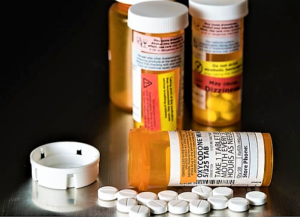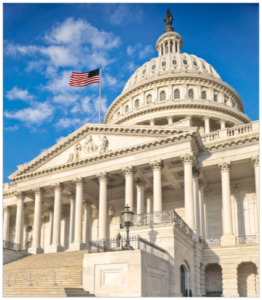- Our bipartisan bill will force drug companies to justify ‘drastic’ price hikes (cnbc.com)
Drug companies are making record profits and at the same time raising the prices of life-saving prescription drugs...Additionally, drug companies have no legal obligation to justify or explain the massive spikes in drug prices...the FAIR Drug Pricing Act, a bill that takes the first step in addressing skyrocketing prescription drug prices by requiring basic transparency for pharmaceutical companies that drastically spike the price of a drug...whose initials stand for “Fair Accountability and Innovative Research," would require drug companies to give notice and justification for raising the price of a drug more than 10 percent at one time or more than 25 percent over three years...For each price increase drug companies would have to tell the public what they spent on manufacturing, research and development costs for the qualifying drug, net profits attributable to the qualifying drug, and marketing and advertising spending on the qualifying drug...
- Right to Try bill clears House, headed for Trump signature (biopharmadive.com)
The House of Representatives...voted....to pass Sen. Ron Johnson’s, R-Wis., Right to Try legislation, sending the bill to President Donald Trump’s desk. The vote is the culmination of a multi-year campaign...which aims to provide access to unapproved drugs under review at the Food and Drug Administration to patients facing life-threatening illnesses with no further options...The bill covers a much broader population than an earlier House-passed version. The president has been a vocal advocate...it may have unintended effects and potentially hinder FDA’s authority without changes...Conservative groups including Freedom Partners and Americans for Prosperity backed the effort, calling attention to the fact that 40 states have passed versions of Right to Try, a strategy employed by Goldwater to drum up momentum for the bill...The Senate version of the legislation is less safe than the pathway proposed in the House version and is dangerous compared to the current expanded access process...The Senate’s bill would allow unproven therapies to be given to patients without FDA notification for up to a full year and would not establish any standards for informed consent...
- NACDS-backed e-prescribing bill to fight opioid abuse passes (chaindrugreview.com)
Legislation backed by the National Association of Chain Drug Stores to help address the opioid abuse epidemic was passed today by the House of Representatives Energy and Commerce Committee. The bill – the Every Prescription Conveyed Securely Act (H.R. 3528) – would require electronic prescribing for Schedule II through V controlled substances prescriptions covered under Medicare Part D to help prevent fraud, abuse and waste...Leveraging the benefits of electronic prescribing to help address the opioid abuse epidemic is one of the priority policy recommendations of NACDS, based on the experiences of pharmacists on the front lines of healthcare delivery.”...The concept of the Every Prescription Conveyed Securely Act maintains strong public support. In a January 2018 national survey conducted by Morning Consult...76% supported rules that all prescriptions must be handled electronically, rather than by paper or fax, as a way to help address the opioid abuse epidemic...The Senate companion legislation of the Every Prescription Conveyed Securely Act is S. 2460, introduced by Sens. Michael Bennet (D, Colo.) and Dean Heller (R, Nev.)...would need to be passed...prior to its proceeding to President Trump for consideration and signature...
- Legislation looks to limit length of opioid prescriptions (biopharmadive.com)
Senate Health Committee Chairman Lamar Alexander...is offering drafts of two pieces of legislation aimed at addressing the opioid crisis...One measure would attempt to limit overprescribing by allowing the Food and Drug Administration to require drug manufacturers to package certain opioids in blister packs, which would allow for a set dose, such as a seven-day supply...Rather than restrict the number of days on opioid prescriptions, James Madara, CEO of the American Medical Association, wrote a letter...suggesting further research "that specifically identifies best practices in settings ranging from surgical to the emergency department."...Alexander's other proposal involves improved coordination between the FDA and Customs Border Protection. The bill would look to improve the ability to find and seize illegal drugs, such as fentanyl, at the border. It would seek to ensure the two agencies have the technology, facilities and staffing needed...
- Study: With FDA Input, Compassionate Use Programs Appear to Work Well (ptcommunity.com)Availability of Investigational Medicines Through the US Food and Drug Administration’s Expanded Access and Compassionate Use Programs (jamanetwork.com)
When terminally ill Americans receive experimental medicines through so-called “compassionate use” programs, they typically only get these drugs after extensive tests for safety and effectiveness, a recent study suggests...This means that sufficient evidence of safety and effectiveness has been generated, ensuring that terminally ill patients are not being exposed to therapies that are unlikely to be beneficial or unsafe...this...suggests that companies and the FDA are providing expanded access to experimental therapies in a responsible way that protects patients and the public health...This system may change under The Right to Try Act of 2017, which would let companies decide whether to give patients experimental therapies without any input from the FDA...The chances of a drug not helping a patient or causing serious harm are higher when medicines are earlier in development, Paul Beninger, MD, MBA, of Tufts University School of Medicine...This is much more likely with Right to Try than with the current compassionate use system…
- Review-Journal investigation spurs call for mental health reform (reviewjournal.com)
Nevada health officials are examining how the state could license consultants who transfer mentally ill people to unregulated group homes, a step prompted by a Las Vegas Review-Journal investigation that highlighted the death of a suicidal woman after she was placed in an unsupervised residence...“This story has been really motivating for people,” said Julie Kotchevar, deputy director at the Nevada Department of Health and Human Services. “It’s certainly been motivating for me to make sure it doesn’t happen again.”...Kotchevar presented lawmakers with an idea: Broaden the state statute that governs “referral agencies” to require anyone doing that type of work to obtain a license. Currently, state law requires a license only for businesses that refer patients to “residential facilities for groups.”
- ‘Penny-a-pill’ funding fades under pressure from pharmaceutical industry (mprnews.org)
When supporters rolled out what they called "penny-a-pill" legislation last month, they described it as a bipartisan effort to raise needed money to combat the opioid overdose epidemic ...But the legislation faces an uncertain future after strong opposition from pharmaceutical companies and some business interests...The legislation...would charge pharmaceutical companies a fee for every opioid painkiller they sell. That would raise an estimated $20 million in continued funding for abuse prevention efforts, wider access to the overdose medication naloxone and more resources for treatment...the House version of the bill no longer includes the fee on manufacturers. Instead, money for the programs would come out of the state general fund, which would be one-time funding.
- Trump signs ‘right to try’ drug bill (thehill.com)
President Trump signed a bill...allowing terminally ill patients access to experimental medical treatments not yet approved by the Food and Drug Administration...Dubbed "right to try," the law's passage was a major priority of Trump and Vice President Pence, as well as congressional Republicans..."Thousands of terminally ill Americans will finally have hope, and the fighting chance, and I think it's going to better than a chance, that they will be cured, they will be helped, and be able to be with their families for a long time, or maybe just for a longer time," Trump said at a bill signing ceremony at the White House, surrounded by terminally ill patients and their families...Most Democrats and public health groups oppose the bill, arguing that it could put patients in danger...FDA oversight of access to experimental treatments exists for a reason — it protects patients from potential snake oil salesmen or from experimental treatments that might do more harm than good...Opponents also argue it gives “false hope” to patients, since drugmakers aren’t required to give unapproved medicines to patients who ask for them...Supporters say, however, it will provide new treatment opportunities for terminally ill patients who have exhausted existing options...
- Right-to-try bill headed for vote puts bigger burden on FDA to protect patients, Gottlieb says (statnews.com)
The House is set to take up a controversial “right-to-try” bill next week — and if it passes, the Food and Drug Administration will have to work harder to protect patients than it would if a different version of the legislation were advancing, Commissioner Scott Gottlieb told STAT...right-to-try legislation aims to give terminally ill patients a different pathway to access experimental treatments that are not FDA approved...“In terms of making sure that it balances [access to experimental drugs] against appropriate patient protections, I think the Walden bill gives us less work to do,” Gottlieb said. “With the Johnson bill, we’d have to do a little bit more … in guidance and perhaps in regulation to achieve some of those goals, and I think those are the goals that Congress wants us to achieve.”
- Nevada State Board of Pharmacy – April Newsletter (bop.nv.gov)
Contraceptive Prescriptions
Prescription Readers
What Pharmacists Need to Know About AB 474
National Pharmacy Compliance News
- FDA Requires Labeling Update on Opioid-Containing Cough and Cold Medicines
- Latest NDTA Shows Opioids Pose Significant Impact to Public Health
- FDA Recognizes Eight European Drug Regulatory Authorities Capable of Conducting Inspections
- Incorrect Use of Insulin Pens at Home Can Cause Severe Hyperglycemia
- FDA Advises on Opioid Addiction Medications and Benzodiazepines
- Only About 3% of Pharmacies and Other Entities Voluntarily Maintain a Prescription Drug Disposal Bin, GAO Reports
- One in Five Drivers Uses a Prescription Drug That Can Impair Driving Despite Receiving Warnings
- PTCB CPhT Program Earns Accreditation From the American National Standards Institute










